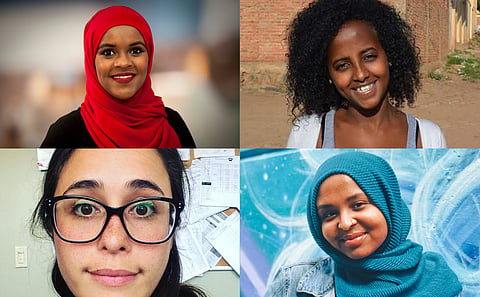Y-WE Hosts Virtual Health Care Injustice Panel
by Thea White
"Young Women Empowered seeks to amplify young women's leadership and role as courageous change makers. We believe in a world where justice is for all and we strive to make that a reality."
—Victoria Santos
Last Saturday, May 23, Young Women Empowered (Y-WE) hosted a virtual panel titled Y-WE Care: Exploring Health Care Injustice, to speak on the injustices this global pandemic highlights in the U.S. health care system. The panel was moderated by Y-WE's Co-Executive Director, Victoria Santos. Santos, who battled COVID-19 in March, took some time to speak on the impact this pandemic has had among BIPOC (Black, Indigenous, People of Color) communities.
"I began to realize as I was reading more and more about this pandemic that the impact is tremendous for communities of color … we have been bearing the burden of marginalization, oppression, lack of health care, lack of nutrition, being exposed to toxic chemicals, all of those things that have really wreaked havoc on the immune system and have created the conditions for this virus to come into our bodies and ravish us."
Panelists Dr. Anisa Ibrahim, Rahwa Ghebremichael, Layla Mohamud, and others joined the conversation by reflecting on the roles they've had to play in the midst of staggered governmental response to the virus. They shared their stance on masks, limited medical translations and the lack of communication between health care clinics and larger medical institutions. The discussion dived into many examples of racism having an impact on the pandemic, with panelists addressing the blatant fact that the slow reaction to the virus was most likely based on the notion of it being a "Chinese disease" and subsequently it was used as a vehicle to target Asian Americans.
A family nurse practitioner in South Seattle, who chooses to remain anonymous out of concern for her job security, shared her disappointment with health care institutions disregarding BIPOC community knowledge. Focusing on the CDC's optional mandate for civilians to wear masks, the nurse practitioner made it clear that the subliminal racist attacks from both government officials and civilians towards Asian Americans who wore masks — following the link to coronavirus in Wuhan — created a barrier where practical thinking was trumped by fear.
Instead of turning to the community to create a system that ensures adequate access to medical services and information, our federal government turned to racist tactics that only further widened the distrust between health care systems and BIPOC (Black, Indigenous, People of Color) communities. Dr. Anisa Ibrahim, U.W. Clinic Assistant Professor of Pediatrics and the medical director at Harborview Pediatrics Clinic, and Y-WE board member Rahwa Ghebremichael brought attention to the effects limited medical translations and Public Service Announcements (PSAs) have on multigenerational households. Looking at the East African community as a point of reference, both highlighted how the lack of translated materials has left communication about the virus to family members.
Worse, production of these medical materials is currently dependent on the volunteer work of dedicated translators instead of full-time employees. Both panelists indicated this only further helps to push families to doubt the relevance of social distancing procedures. When you think about it, it makes sense: if you're only hearing from a loved one about an illness and not your doctor, it would be easy to question it. And even easier if you are constantly watching the federal COVID-19 task force press conferences and hear the president say he'll refuse to wear a mask and then suggest that an injection of bleach could be a suitable cure.
Near the end of the panel, Layla Muhamud, a student at the University of Washington, gave her insight on the emotional strain many students of color have had to experience in the midst of the pandemic. Muhamud, who has been very active on campus through her participation in various clubs, opened up about her own trials when trying to focus on the wellbeing of her family while also managing schooling. Muhamud shared with the panel that there are a number of students who often find themselves having to choose between affording their classes and visiting the school clinic — which is not only an additional cost to students who may already be struggling to cover other school expenses, but outstanding medical campus medical bills can also be a barrier when applying for classes.
As the panel looked at steps needed to move forward, it was clear that this is a time for us to stand together and lean on the ways that we know to take care of one another. Whether that means wearing a mask even though you're not sick, serving as a translator to those who may need help understanding CDC guidelines, giving blood, or standing in solidarity with communities who've been the target of undeserved blame. We all must stand as one instead of pointing fingers — our lives depend on it, now more than ever.
Editor's Note: This post was updated on 6/6/20 to remove the name of a nurse practitioner who feared her job might be in jeopardy should her employer become aware that she had spoken out publicly about her employer's response to the novel coronavirus outbreak.
Thea White is an educator, community advocate and aspiring truth-teller who calls Seattle home. Few things are more wonderful to her than reading her favorite comics while listening to Jonelle Monae.
Featured image: photo courtesy of Young Women Empowered.
Help keep BIPOC-led, community-powered journalism free — become a Rainmaker today.


